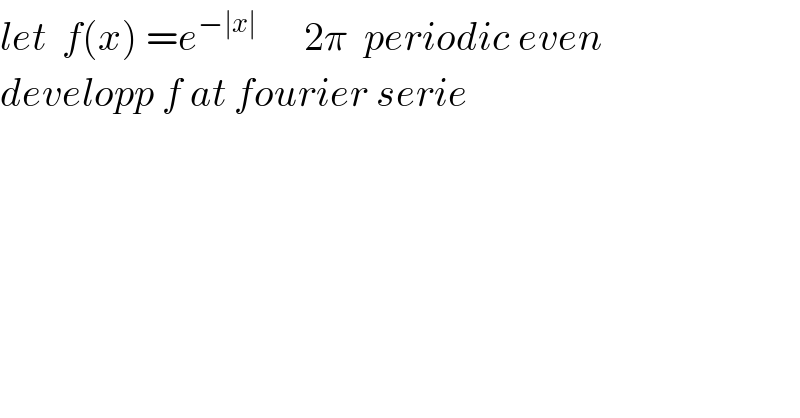Question Number 67379 by mathmax by abdo last updated on 26/Aug/19

$${let}\:\:{f}\left({x}\right)\:={e}^{−\mid{x}\mid} \:\:\:\:\:\:\mathrm{2}\pi\:\:{periodic}\:{even} \\ $$$${developp}\:{f}\:{at}\:{fourier}\:{serie} \\ $$
Commented by Abdo msup. last updated on 28/Aug/19
![f(x)=(a_0 /2) +Σ_(n=1) ^∞ a_n cos(nx) with a_n =(2/T) ∫_([T]) f(x)cos(nx)dx=(2/(2π)) ∫_(−π) ^π e^(−∣x∣) cos(nx)dx =(2/π) ∫_0 ^π e^(−x) cos(nx)dx ⇒(π/2) a_n = ∫_0 ^π e^(−x) cos(nx)dx =Re( ∫_0 ^π e^(−x+inx) dx) =Re(∫_0 ^π e^((−1+in)x) dx) but ∫_0 ^π e^((−1+in)x) dx =[(1/(−1+in)) e^((−1+in)x) ]_0 ^π =−(1/(1−in)){ e^((−1+in)π) −1} =−((1+in)/(1+n^2 )){ e^(−π) (−1)^n −1) =((1−(−1)^n e^(−π) )/(1+n^2 ))(1+in) ⇒ (π/2)a_n =((1−(−1)^n e^(−π) )/(1+n^2 )) ⇒a_n =((2{1−(−1)^n e^(−π) )/(π(1+n^2 )))](https://www.tinkutara.com/question/Q67557.png)
$${f}\left({x}\right)=\frac{{a}_{\mathrm{0}} }{\mathrm{2}}\:+\sum_{{n}=\mathrm{1}} ^{\infty} \:{a}_{{n}} {cos}\left({nx}\right)\:\:{with} \\ $$$${a}_{{n}} =\frac{\mathrm{2}}{{T}}\:\int_{\left[{T}\right]} \:\:{f}\left({x}\right){cos}\left({nx}\right){dx}=\frac{\mathrm{2}}{\mathrm{2}\pi}\:\int_{−\pi} ^{\pi} {e}^{−\mid{x}\mid} \:{cos}\left({nx}\right){dx} \\ $$$$=\frac{\mathrm{2}}{\pi}\:\int_{\mathrm{0}} ^{\pi} \:\:\:{e}^{−{x}} \:{cos}\left({nx}\right){dx}\:\Rightarrow\frac{\pi}{\mathrm{2}}\:{a}_{{n}} =\:\int_{\mathrm{0}} ^{\pi} \:{e}^{−{x}} \:{cos}\left({nx}\right){dx} \\ $$$$={Re}\left(\:\int_{\mathrm{0}} ^{\pi} \:{e}^{−{x}+{inx}} {dx}\right)\:={Re}\left(\int_{\mathrm{0}} ^{\pi} \:{e}^{\left(−\mathrm{1}+{in}\right){x}} {dx}\right) \\ $$$${but}\:\int_{\mathrm{0}} ^{\pi} \:{e}^{\left(−\mathrm{1}+{in}\right){x}} {dx}\:=\left[\frac{\mathrm{1}}{−\mathrm{1}+{in}}\:{e}^{\left(−\mathrm{1}+{in}\right){x}} \right]_{\mathrm{0}} ^{\pi} \\ $$$$=−\frac{\mathrm{1}}{\mathrm{1}−{in}}\left\{\:{e}^{\left(−\mathrm{1}+{in}\right)\pi} −\mathrm{1}\right\} \\ $$$$=−\frac{\mathrm{1}+{in}}{\mathrm{1}+{n}^{\mathrm{2}} }\left\{\:{e}^{−\pi} \left(−\mathrm{1}\right)^{{n}} −\mathrm{1}\right)\:=\frac{\mathrm{1}−\left(−\mathrm{1}\right)^{{n}} {e}^{−\pi} }{\mathrm{1}+{n}^{\mathrm{2}} }\left(\mathrm{1}+{in}\right)\:\Rightarrow \\ $$$$\frac{\pi}{\mathrm{2}}{a}_{{n}} =\frac{\mathrm{1}−\left(−\mathrm{1}\right)^{{n}} {e}^{−\pi} }{\mathrm{1}+{n}^{\mathrm{2}} }\:\Rightarrow{a}_{{n}} =\frac{\mathrm{2}\left\{\mathrm{1}−\left(−\mathrm{1}\right)^{{n}} {e}^{−\pi} \right.}{\pi\left(\mathrm{1}+{n}^{\mathrm{2}} \right)} \\ $$$$ \\ $$$$ \\ $$
Commented by Abdo msup. last updated on 28/Aug/19
![we have a_0 =(2/π) ∫_0 ^π e^(−x) dx =(2/π)[−e^(−x) ]_0 ^π =(2/π){1−e^(−π) } ⇒(a_0 /2) =((1−e^(−π) )/π) ⇒ e^(−∣x∣) =((1−e^(−π) )/π) +(2/π)Σ_(n=1) ^∞ (({1−(−1)^n e^(−π) })/(1+n^2 )) cos(nx)](https://www.tinkutara.com/question/Q67558.png)
$${we}\:{have}\:{a}_{\mathrm{0}} =\frac{\mathrm{2}}{\pi}\:\int_{\mathrm{0}} ^{\pi} \:\:{e}^{−{x}} \:{dx}\:=\frac{\mathrm{2}}{\pi}\left[−{e}^{−{x}} \right]_{\mathrm{0}} ^{\pi} \\ $$$$=\frac{\mathrm{2}}{\pi}\left\{\mathrm{1}−{e}^{−\pi} \right\}\:\Rightarrow\frac{{a}_{\mathrm{0}} }{\mathrm{2}}\:=\frac{\mathrm{1}−{e}^{−\pi} }{\pi}\:\Rightarrow \\ $$$${e}^{−\mid{x}\mid} \:=\frac{\mathrm{1}−{e}^{−\pi} }{\pi}\:+\frac{\mathrm{2}}{\pi}\sum_{{n}=\mathrm{1}} ^{\infty} \:\:\frac{\left\{\mathrm{1}−\left(−\mathrm{1}\right)^{{n}} {e}^{−\pi} \right\}}{\mathrm{1}+{n}^{\mathrm{2}} }\:{cos}\left({nx}\right) \\ $$
